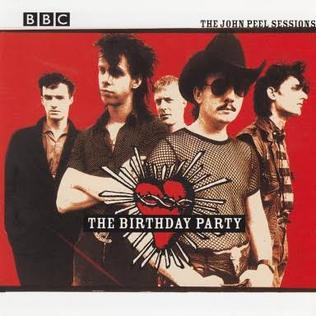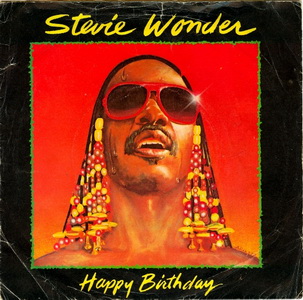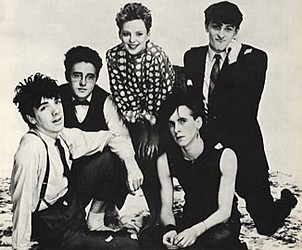Related Research Articles

"Happy Birthday to You", or simply "Happy Birthday", is a song traditionally sung to celebrate a person's birthday. According to the 1998 Guinness World Records, it is the most recognized song in the English language, followed by "For He's a Jolly Good Fellow". The song's base lyrics have been translated into at least 18 languages. The melody of "Happy Birthday to You" comes from the song "Good Morning to All", which has traditionally been attributed to American sisters Patty and Mildred J. Hill in 1893, although the claim that the sisters composed the tune is disputed.

The Birthday Party were an Australian post-punk band, active from 1977 to 1983. The group's "bleak and noisy soundscapes," which drew irreverently on blues, free jazz, and rockabilly, provided the setting for vocalist Nick Cave's disturbing tales of violence and perversion. Their 1981 single "Release the Bats" was particularly influential on the emerging gothic scene. Despite limited commercial success, The Birthday Party's influence has been far-reaching, and they have been called "one of the darkest and most challenging post-punk groups to emerge in the early '80s."

Happy Mondays are an English rock band formed in Salford in 1980. The original line-up was Shaun Ryder (vocals), his brother Paul Ryder (bass), Gary Whelan (drums), Paul Davis (keyboard), and Mark Day (guitar). Mark "Bez" Berry later joined the band onstage as a dancer/percussionist. Rowetta joined as a second vocalist in 1990. They were initially signed to Tony Wilson's Factory Records label.

Terence Edward Hall was a British musician who came to prominence as the lead singer of the 2-tone band the Specials, and later recorded with groups such as Fun Boy Three, the Colourfield, Terry, Blair & Anouchka, and Vegas.
Mute Records is a British independent record label owned and founded in 1978 by Daniel Miller. It has featured several prominent musical acts on its roster such as Depeche Mode, Erasure, Einstürzende Neubauten, Fad Gadget, Goldfrapp, Grinderman, Inspiral Carpets, Moby, New Order, Laibach, Nitzer Ebb, Yann Tiersen, Wire, Yeasayer, Fever Ray, Nick Cave and the Bad Seeds, Yazoo, and M83.

Magazine were an English rock band formed in 1977 in Manchester in England by singer Howard Devoto and guitarist John McGeoch. After leaving the punk group Buzzcocks in early 1977, Devoto decided to create a more progressive and less "traditional" rock band. The original lineup of Magazine was composed of Devoto, McGeoch, Barry Adamson on bass, Bob Dickinson on keyboards and Martin Jackson on drums.

Raymond Ian Burns, known by the stage name Captain Sensible, is an English guitarist, singer and songwriter. He co-founded the punk rock band the Damned in 1976, originally playing bass before switching to guitar. He is known for his distinctive appearance including a red beret and sunglasses, typically with white frames. Sensible embarked on a solo career during the 1980s, achieving a UK number one hit with his version of Rodgers and Hammerstein's "Happy Talk" (1982) and further hits with "Wot" (1982) and "Glad It's All Over" (1984). In 2006, Sensible founded the Blah! Party. He continues to perform in the Damned.
Tuff Monks were a short-lived band consisting of Nick Cave, Mick Harvey and Rowland S. Howard with Robert Forster, Lindy Morrison and Grant McLennan. Their only release was the 1982 7" 45 rpm single "After the Fireworks", on the Australian label, Au Go Go Records. The lead track was co-written by Cave, Forster and McLennan.

"Happy Birthday" is a song written, produced and performed by Stevie Wonder for the Motown label. Wonder, a social activist, was one of the main figures in the campaign to have the birthday of Martin Luther King Jr. become a national holiday, and created this single to promulgate the cause. The song has since become a standard for use during birthdays in general, particularly among African-Americans.

John Lennon was a British singer-songwriter and peace activist, best known as the co-founder of the Beatles. After three experimental albums with Yoko Ono, using tape loops, interviews, musique concrète, and other avant-garde performance techniques, Lennon's solo career properly began with the 1969 single "Give Peace a Chance". Lennon then released two more singles, "Cold Turkey" (1969) and "Instant Karma!" (1970), and a live album, Live Peace in Toronto (1969), before the official break-up of the Beatles.

Julia Fordham is a British singer-songwriter. Her professional career started in the early 1980s, under the name "Jules Fordham", as a backing singer for Mari Wilson and Kim Wilde, before signing a recording contract of her own later that decade. Fordham is now based in California.
Girls at Our Best! were an English post-punk band, founded in Leeds, England in 1979 under the name The Butterflies. They had several UK Independent Singles Chart hits during their three-year existence.

Altered Images are a Scottish new wave/post-punk band who found success in the early 1980s. Fronted by singer Clare Grogan, the group branched into mainstream pop music, having six UK top-40 hit singles and three top-30 albums from 1981 to 1983. Their hits include "Happy Birthday", "I Could Be Happy", "See Those Eyes", and "Don't Talk to Me About Love".
Things of Stone and Wood or ToSaW are an Australian folk rock band which formed in 1989. The original line-up was Michael Bruce Allen on bass guitar and backing vocals; Greg Arnold on lead vocals and acoustic guitar; Justin Brady on violin, mandolin and harmonica; and Tony Floyd on drums and percussion. Two of their albums, The Yearning and Junk Theatre peaked at No. 8 on the ARIA Albums Chart. Their 1992 single, "Happy Birthday Helen", which reached No. 9 on the ARIA Singles Chart, was written by Arnold for his then-girlfriend, whom he later married. At the ARIA Music Awards of 1993 the group won ARIA Award for Best New Talent for "Share This Wine". Arnold won 'Songwriter of the Year' at the 1993 APRA Awards.
Hee Haw is the second release and first EP by the Australian post-punk band the Boys Next Door. The Hee Haw EP was released in 1979 by the independent label, Missing Link Records.
The Fallout Club was a British synth-pop and new wave band formed by Irish singer Trevor Herion, the experimental drummer Paul Simon, future successful Thomas Dolby on keyboards, and bassist Matthew Seligman in 1981. Herion and Simon formed the band shortly after the demise of their previous group, the Civilians, while Dolby was in Bruce Woolley and the Camera Club Seligman, who also had played in the Soft Boys.
Kendra Smith is an American musician who was a founding member of The Dream Syndicate, a member of Opal, and later recorded as a solo artist.
Cathal Dunne is an Irish singer. He is most famous for representing Ireland in the 1979 Eurovision Song Contest with the song "Happy Man". He has since gained a following as Cahal Dunne, performing traditional Irish songs in the United States, where he now lives.
Majid Jordan is a Canadian R&B duo, consisting of singer Majid Al Maskati and producer Jordan Ullman from Toronto, Ontario. They formed in 2011 and signed to OVO Sound, the record label co-founded by rapper Drake, producer Noah "40" Shebib and Oliver El-Khatib, releasing their debut EP, A Place Like This, in 2014.
The discography of The Birthday Party, an Australian post-punk band, consists of four studio albums, two live albums, six compilation albums, six extended plays and nine singles. The group began under various names in Melbourne in 1973; formed by vocalist Nick Cave, guitarist Mick Harvey, drummer Phill Calvert, guitarist John Cocivera, bassist Brett Purcell, and saxophonist Chris Coyne —all of whom were students at Caulfield Grammar School. By 1978, following several membership changes, the band consisted of Cave, Harvey and Calvert with bassist Tracy Pew and guitarist Rowland S Howard. Under the name The Boys Next Door, the band released several singles and two studio albums, Door, Door in 1979 on Mushroom Records and The Birthday Party in 1980 on Missing Link Records.
References
- ↑ Gimarc, George (2005). Punk Diary: The Ultimate Trainspotter's Guide to Underground Rock, 1970-1982. Hal Leonard Corporation. p. 294. ISBN 9780879308483 . Retrieved 21 September 2014.
- ↑ Strong, Martin Charles (2003). The Great Indie Discography. Canongate U.S. ISBN 9781841953359 . Retrieved 21 September 2014.